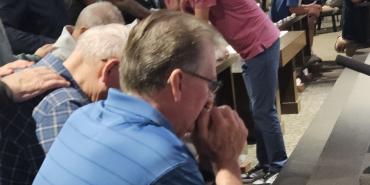Another Bozo on the Bus

The secret of the holy life is self-surrender. Always has been, always will be. That's the conclusion Mary Reuter reached in her 1,112-page Duquesne University Ph.D. dissertation.
She was right, according to the saints in every age. They have termed it self-denial, self-donation, or self-surrender.
After 30 years of spiritual detours and dead ends, Augustine found the essence of the holy life in a moment of self-surrender—and that's why we call him Saint Augustine.
Teresa of Avila prayed, "Govern everything . . . O Lord, so that my soul will always be serving you . . . Let me die to myself so that I may serve You."
Every New Year's Day, John Wesley led his people in a Covenant Service that included this prayer of self-surrender:
O Lord Jesus,
I give Thee my body,
my soul,
my substance,
my fame,
my friends,
my liberty,
and my life
dispose of me and all that is mine,
as it seems best to Thee.
Nineteenth-century Holiness pioneer, Hannah Whitall Smith, wrote, "I do give myself up unreservedly to God to be and to do just what He wills, and I do trust only Jesus to keep me . . . cleanse me, and sanctify me wholly" (Dieter 1986, 249). Her contemporary, Frances Ridley Havergal, offered her prayer of self-surrender in a song:
Take my will and make it Thine-
It shall be no longer mine.
Take myself—and I will be
Ever, only, all for Thee.
A 20th-century pastor offered this prayer while considering a call to a bigger church:
Today, O Lord, I surrender to You
my hopes, my dreams, my ambitions.
Do with them what You will, when You will, as You will.
I release into Your hands my need to control,
my craving for status,
my fear of obscurity.
Eradicate the evil, purify the good . . .
The old-timers of my boyhood spoke of "putting your all on the altar," "dying out to sin," and "laying the unknown bundle on the altar." They knew that self-surrender was a step toward sanctifying grace. They knew self-surrender was a prelude to the sanctifying moment and an integral part of the sanctifying journey. That's why they would testify, "I am sanctified and I am being sanctified." I guess I heard that a thousand times.
Contemporary believers also discover the need for self-surrender. Take Anne Lamott, for example. She does not know "Christianese," the language of church insiders. She grew up in California's drug and sex culture of the 70s. She fought alcohol addiction for a long time. Then she found Jesus Christ. With her fellow Christians holding one hand and Jesus the other she finally kicked alcohol. She has been sober for some two decades now.
When she became a Christian, she tried to take charge of her life. She wanted to be a real Christian, not just a garden-variety believer. But the harder she tried, the more she failed.
Then followed a pivotal prayer of self-surrender. She did not say, "I put the unknown bundle on the altar" nor did she sing, "I Surrender All." Instead, as she reported in Plan B: Further Thoughts on Faith, "I told God I was taking my sticky fingers off the steering wheel, and that God could be the driver and I would be just another bozo on the bus."
Have you ever heard a better prayer of self-surrender?
The secret of the holy life is self-surrender. Always has been, always will be.
Wes Tracy taught Christian preaching and adult education at Nazarene Theological Seminary. He has also served as editor of the Herald of Holiness and Preacher's Magazine.
References:
Dieter, Melvin E. and Hallie A. 1986. God Is Enough. Grand Rapids, Michigan: Francis Asbury Press. |
Holiness Today, 2010
Please note: This article was originally published in 2010. All facts, figures, and titles were accurate to the best of our knowledge at that time but may have since changed.




